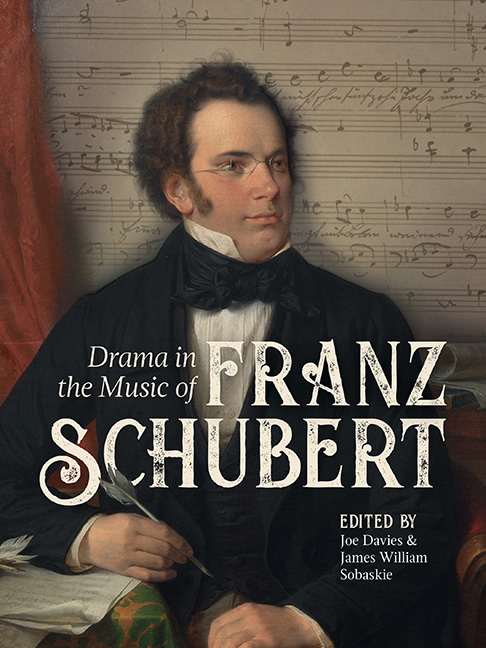Introduction: Internal Dramas
Published online by Cambridge University Press: 25 March 2020
Summary
What did drama mean for Schubert? What does drama in Schubert mean now? These two questions run in the background of this volume. Schubert has rarely been lauded as a dramatic composer, at least when using nineteenth-century criteria. It is clear from contemporary criticism that, in German-speaking lands, ‘drama’ was associated then almost exclusively with the theatre. Attempting to un- or recover an understanding of the dramatic in Schubert thus prompts consideration of the ways in which his music is heard these days. It also asks which musical genres are heard as dramatic: Schubert wrote in almost every genre available to him, and what might be thought of as dramatic needs to be adjusted according to whether he was dealing with the theatre, concert stage, church, salon, or home. That his operatic works are often judged to have failed ‘dramatically’ perhaps signals a problem of definition above all.
In its entry on Schubert, Grove Music Online includes a section by Robert Winter on ‘Dramatic music’, said to be the arena that caused him most ‘frustration’:
At first blush, the sense of drama evinced by songs like Erlkönig, not to mention his dazzling lyrical gift, would seem to have marked Schubert as an ideal composer of dramatic music. But like Haydn, Schubert lacked the instinct for long-range planning and cumulative dramatic development that came so naturally to a Mozart or a Verdi.
Furthermore, circumstances were against him: the two principle Viennese theatres, the Burgtheater and Karntnertortheater, were both in decline, there was a dearth of decent librettists, and the works of Rossini dominated operatic repertoire from 1816 onwards. Yet Schubert began more than sixteen dramatic works between 1811 and 1827; over half were Singspiele and the rest ranged from grand opera (Alfonso und Estrella and Fierabras), to melodrama (Die Zauberharfe), and incidental music (for Helmina von Chezy's Rosamunde, Fürstin von Zypern). Not even the completed compositions have attained a secure footing in the repertoire in their original form, although portions of some scores – notably Rosamunde – have enjoyed an afterlife in other, primarily instrumental genres.
- Type
- Chapter
- Information
- Drama in the Music of Franz Schubert , pp. 1 - 8Publisher: Boydell & BrewerPrint publication year: 2019



